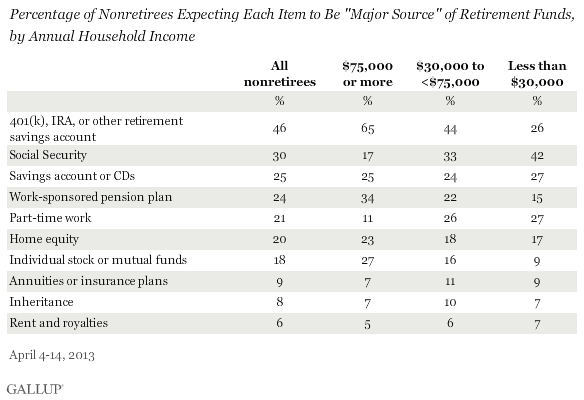HOW TO USE AGE BASED FUNDS IN A 401(K) PLAN
Post on: 17 Октябрь, 2015 No Comment

How to Use Age Based Funds in a 401(k) Plan
Sponsored links:
Age-based funds, also known as target-date funds, can provide less sophisticated 401(k) participants with a means of preparing for retirement that fits their risk tolerance and investment objectives. The following steps will explain how these funds work and how to properly use them.
Stories similar to How to Use Age Based Funds in a 401(k) Plan :
Additional information on How to Use Age Based Funds in a 401(k) Plan :
- To discourage the use of 401k plan funds for any reason other than . from the account before age 59 1/2 may not only be subject to income taxes based on an .
- Aug 18, 2009 . Age -based funds are normally set up as mutual funds. . However, there has been a surge of popularity of their use in the 529 plans as well.
- Jan 2, 1970 . 401k Retirement Age 55. 401k plans allow for penalty-free withdrawals at age 55. To use this 401k retirement age 55 provision you must: .
- 401 (k) are defined contribution plans with annual contributions limited, currently. . Any withdrawal that is permitted before the age of 59½ is subject to an excise tax . The amount of distributions is based on life expectancy according to the . in which prospective business owners use their 401k retirement funds to pay for .
- Should I use my 401 (k) to fund my childs college education? . Your 401 (k) plan should be dedicated primarily to your retirement. . owe the 10 percent premature distribution penalty on withdrawals you make before age 59½, . you should seek advice based on your particular circumstances from an independent advisor .
- Jan 17, 2012 . Target-date funds. which allocate investments based on the savers age. have also proven inadequate, McCool says. Its a cookie-cutter, .
- Oct 30, 2012 . To make your 401 (k) plan work, youve had to become an expert on markets, . In a typical plan. your employer essentially hands you a list of funds and says . in a 401 (k) plan. based on his or her age. savings, and income goals. (You can use one of these programs only if your employer makes it an option.) .
- 1 Here we use the term 401 (k) plans to refer broadly to private-sector defined contribution plans . age -based equity glide path inherent in target-date funds .
Related links about How to Use Age Based Funds in a 401(k) Plan :
1. Using Age -Based Funds In Your 401 (k)
2. A new type of 401 (k) — CNN Money
3. Target-Date Funds in 401 (k) Retirement Plans — Business .
4. Secrets of the 401k millionaires — 1 — retirement planning — MSN Money
5. 401k Retirement Age — At What Age Can You Withdraw Funds From .
Learn how to properly allocate 401(k) funds in this easy-to-read guide. This is a great place to start learning more about the 401(k) and where the funds should be allocated. It’s really easy to ensure 401(k) funds are properly allocated once the process is begun, but where to start? How to Properly Allocate 401(k) funds.
Mutual Bond funds are popular for relatively low risk and to receive an income stream. Mutual bond funds risks are based on the debt instruments they hold. Mutual bond funds invest in bond markets around the world, corporate and government debt. Junk bonds and emerging nation bonds are considered the riskiest. Many see Mutual bond funds as a contrarian investment a hedge in a portfolio for when stock funds values fall.
Mutual Fund Categories for Performance
This Mutual Funds for Dummies tutorial concerns the 3 main categories of mutual funds, if you want to know more about what a mutual fund is, you should first check out Mutual Funds for Dummies — What is a Mutual Fund
Mutual funds are a great choice for the investor that just wants their investment to perform and doesn’t want to have to worry about keeping up with the stock market details, or the money market interest rate, or which stock index to focus on.
This article will spotlight the numerous advantages of investing in ETFs or Exchange trade funds and how it can in reality bolster your investment finances. Exchange trade funds are reasonably new investment tools that work like mutual funds but can be traded much like stocks. Exchange Trade Funds, are investment units based on a certain index such as S&P 500. As an investor, you can buy or sell shares of a whole portfolio of stocks in a single trade.
These funds may be bought on margin, subject to the same terms that are applied to common stocks.
Mutual Funds for Dummies — is not really for dummies, because if you have money to invest, or want to know more about investment vehicles, you are certainly not a dummy, but just someone who is looking for a basic non-CPA explanation of how mutual funds work.














